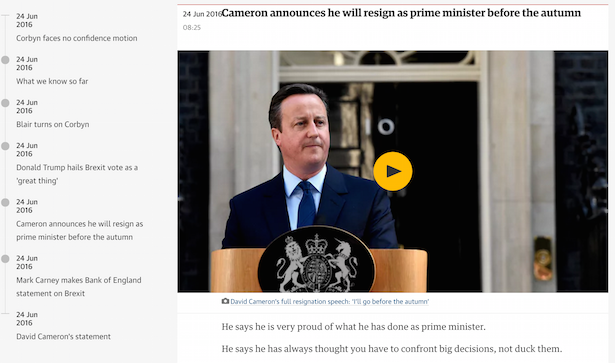
Whether you’re happy with the EU referendum result or not, there’s no doubt that it has stirred up plenty of political debate.
This in turn has translated into more traffic for many of the UK’s newspaper websites, according to ABC figures released this week.
While the referendum has delivered a boost for many news sites, some have done better than others. Namely the Guardian and The Telegraph, with the latter having the most impressive growth.
UK unique users, June vs May:
Telegraph up 20% MOM
Guardian up 14%
Mail Online, no change.
Sun up 5%
Mirror up 2.9%
Global unique users, June vs May:
Telegraph up 21%
Guardian up 9%
Mail Online up 5%
Sun up 12%
Mirror up 5%.
So, while the Brexit effect is there to see, it’s more pronounced for some than others.
The Guardian
The Guardian is reporting its strongest month ever with more than a billion pages views for the first time in a calendar month, and a record 167m monthly uniques.
In addition, thanks to content such as its live Brexit blog, The Guardian enjoyed its highest day’s traffic ever, with more than 17m uniques and 77m pageviews on June 24, the day the referendum results were announced.
The Telegraph
While the Guardian figures were impressive, The Telegraph has outstripped them in terms of month on month growth.
In charts tweeted by The Telegraph’s Director of Digital Media Malcolm Coles, we can see the Brexit effect:
And so did we pic.twitter.com/dhTVcsc12l
— Malcolm Coles (@malcolmcoles) 21 July 2016
As a side point, The Sun was one of the few sites that didn’t experience a post-Brexit lift. The spike you can see comes after the 24th, and is from its Dream Team football app, not news.
Perhaps, given that The Sun was very pro-Brexit, to the extent of not reporting any possible negatives, web users didn’t trust it as a reliable source of information.
Indeed, when the Sun did talk about the negatives post-Brexit, readers suddenly wondered why they hadn’t been told this before.
Sun’s ABC. Post brexit was lowest PVs for 2 weeks. Spike in PVs on 26th is nearly all from Dream Team app, not site. pic.twitter.com/egGsGApN6L
— Malcolm Coles (@malcolmcoles) July 21, 2016
I suspect than a strong SEO strategy has much to do with The Telegraph’s impressive performance.
It regularly has a prominent feature in news results, while it ranks well for key topics thanks to a well-executed strategy which includes effective internal linking and landing / hub pages for key topics.
For example, this is from a post on Mail Online’s strategy, showing how effectively the Telegraph used linking. It shows the performance of its ‘David Cameron’ page:
This page performs consistently as The Telegraph links its other Cameron content back to this page, which indicates to the search engines that this is the page to show for that phrase.
This means that, instead of having several articles on the them competing against each other leading to fluctuation in search rankings, it has one dedicated hub page.
It appears to have repeated this approach for the EU referendum, with a hub page for the issue. As I search this morning, it’s the highest-ranked newspaper site for the term.
Thus, when the traffic spiked, on June 24, The Telegraph was in a strong position to attract search traffic.
In addition, The Telegraph has been very smart in picking up traffic for informational searches around events like the referendum, or Euro 2016 – when events are, start times, where you can watch the, and so on.
For example, this page comes up for searches around the Tour de France today, providing information on stage start times, TV coverage etc.
This content provides useful information for searchers which directly answers some informational queries, but also helps to showcase the rest of the site’s cycling coverage to help it attract extra users.
It seems that this strategy has been applied across a range of news and sporting events, and is a great tactic to take advantage of ‘who, what, where’ searches.
I don’t have detailed data on where The Telegraph’s month on month growth came from, but I’m betting a smart SEO strategy enabled it to take full advantage of the extra interest in news around the Brexit vote.
Source: ClickZ
Link: Has Brexit helped give The Telegraph an SEO boost?



Leave a Reply